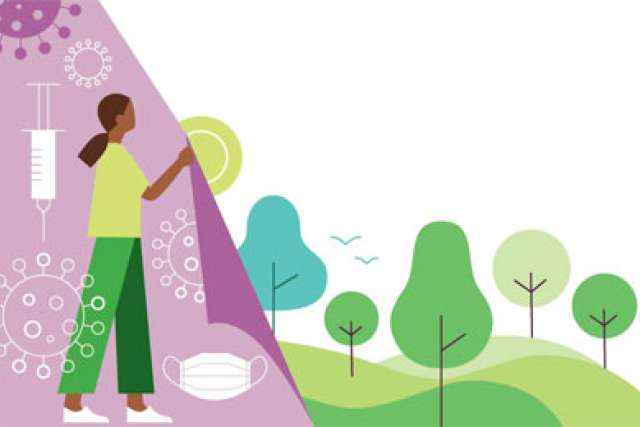As a physician responsible for the care of cancer patients, I have been engaged for more than a year now in efforts to protect some of the most vulnerable among us from the effects of COVID-19 infection. We are all familiar with what this virus has wrought on humanity in terms of death and suffering, and with the constrictions our responses to this threat have necessarily placed on our lives and livelihoods. Although vaccination promises to control COVID-19 in the United States in the not-toodistant future, it is important that, for now, we continue responsible mask-wearing and distancing to minimize the suffering and deaths that will still occur before COVID is contained. We are all exhausted. And we frequently say that we want to “return to normal.”
But, do we really? This intense pandemic experience has reacquainted us with some fundamental truths we had been neglecting. COVID-19 made clear our dependence upon each other as a people for our personal and environmental health and welfare. It has awakened in all of us an awareness of how many medically and economically vulnerable people share this city, this country and this earth, and in some of us it has stirred a renewed cognizance and sense of some responsibility for them. We have been vividly reminded that misfortune and fragility and opportunity are not equitably distributed in this world, and that social justice is imperfect and often elusive. Our common humanity has been laid bare for all to see and hopefully to profitably contemplate. As we continue to show our respect for life and for each other by masking and distancing, we are close enough to COVID control to begin asking ourselves where we want to go from here.
Before the 1918 influenza pandemic, the only event in the United States that had a mortality of 600,000 souls was the Civil War. In 1863, an exhausted President Abraham Lincoln, speaking on a fresh battlefield of that war and trying to salvage something from the carnage, spoke of “unfinished work” and of dedication to a “great task remaining,” and he encouraged an “increased devotion” as the only way he could find to appropriately honor the souls lost. Ultimately, that painful American catastrophe resulted in advances in human equality and social justice in this country that otherwise would not have soon occurred. From suffering came improvement, and the lost souls were honored.
During the year since COVID-19 began, I have witnessed many humbling and inspiring examples of individuals and organizations generously, and sometimes heroically, acting to help the vulnerable, weak and marginalized. Often enough, these actors were new to the work, moved to see and to act by the pandemic. In many cases, though, these individuals and organizations were already involved in their work before COVID-19 was a thing. The pandemic obviously disproportionately stressed the most fragile and increased their needs for assistance, but it also caused us to notice again what had always been there, obscured by the background white noise of injustice and suffering in our city, country and world. These human needs and our common humanity existed before, and they will remain after COVID.
I don’t want to return exactly to my life before COVID. Looking back to that time, I believe we may have fallen prey to runaway individualism and mean-spiritedness in our government and public lives and to excessive materialism, self-absorption and intoxication with the trivial in our private lives. There were things unnoticed that, had I seen better, would have added meaning to my life. Certainly, I want my grandchildren back in school, to have large dinner parties with friends, to go to bars and restaurants, to travel for pleasure and to not need to wear a mask. But I am intrigued by how much deeper and satisfying life could be with a little more brotherhood and a little less elbow throwing, and how enriching it is to do some of the now-more-evident “unfinished work” that was obscured by pre-COVID scheming, bickering and indolence.
Cancer survivors looking back years later very often tell me that their lives have been richer and more fulfilling because they have that history. They come to understand, as Lincoln did, that this can be a final triumphant step in the human response to suffering: We harness it and get it to pull us to a better place. There is an incredible opportunity here; after all, there is clearly a “great task remaining” and so many souls to honor.

